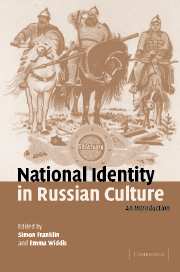Book contents
- Frontmatter
- Contents
- List of illustrations
- Notes on contributors
- Preface
- Note on the transliteration of Russian
- Map: The growth and contraction of Russia and its empire
- 1 ‘All the Russias …’?
- SECTION I IDENTITIES IN TIME AND SPACE
- SECTION II CONTRASTIVE IDENTITIES: ‘US’ AND ‘THEM’
- 4 ‘Us’: Russians on Russianness
- 5 ‘Them’: Russians on foreigners
- SECTION III ‘ESSENTIAL’ IDENTITIES
- SECTION IV SYMBOLS OF IDENTITY
- Afterword
- Notes
- Selected further reading in English
- Index
5 - ‘Them’: Russians on foreigners
Published online by Cambridge University Press: 04 May 2010
- Frontmatter
- Contents
- List of illustrations
- Notes on contributors
- Preface
- Note on the transliteration of Russian
- Map: The growth and contraction of Russia and its empire
- 1 ‘All the Russias …’?
- SECTION I IDENTITIES IN TIME AND SPACE
- SECTION II CONTRASTIVE IDENTITIES: ‘US’ AND ‘THEM’
- 4 ‘Us’: Russians on Russianness
- 5 ‘Them’: Russians on foreigners
- SECTION III ‘ESSENTIAL’ IDENTITIES
- SECTION IV SYMBOLS OF IDENTITY
- Afterword
- Notes
- Selected further reading in English
- Index
Summary
The Greeks, as they invariably did, had a word for it, or in this case, for ‘them’. The word was barbaros, and it meant a person who did not speak Greek and, by extension, was not open to the benefits of Greek culture and civilization. The Romans, who took so many things from the Greeks, also took the word with analogous application to the non-Latin speakers and the unenlightened mob. It was their invaders from the North, the Huns and the Goths, who became the very incarnation of Barbarians, writ large, for the havoc they wrought in the very epicentre of the civilized world. The negative cultural implications of the word thereafter took precedence over the linguistic. In the post-medieval world, countries vied to call each other names, among which ‘barbarian’ was particularly prominent. The French became especially generous in applying the word to everyone and anyone who did not subscribe to the glories of French civilization and, by inference, to the majesty of the French language. They were never slow to brand the English ‘barbarians’, attributing the defect to the Roman legacy or Germanic ancestry of the English, and finding, for instance, a splendid condemnation of ‘barbares Anglois’ whose ‘cruels couteaux / Coupent la tête aux rois, et la queue aux chevaux’. By the eighteenth century, however, Britain, France, Germany, Holland, and Italy, whatever they had called each other in the past and continued to do sotto voce, were at least united in viewing the countries further north or, by an increasingly common re-alignment of the map, to the east as lands of darkness populated by barbarians and awaiting the sun of the Enlightenment.
- Type
- Chapter
- Information
- National Identity in Russian CultureAn Introduction, pp. 74 - 92Publisher: Cambridge University PressPrint publication year: 2004
- 1
- Cited by

